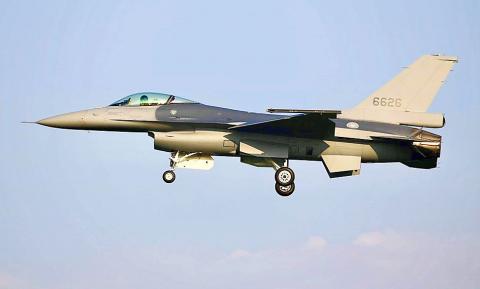A report published on Tuesday by US-based China academics advises US President Donald Trump’s administration to assist Taiwan’s capability in asymmetrical warfare while taking a balanced approach to China that pressures Beijing on harmful conduct while remaining open to dialogue and cooperation.
The report, titled Course Correction: Toward an Effective and Sustainable China Policy, was jointly written by Asia Society’s Center on US-China Relations and the 21st Century China Center at the University of California, San Diego.
China has shown a desire to pressure Taiwan’s government toward unification, and deter or delay US intervention in a conflict over Taiwan, which could lead to an US-China armed conflict given the US’ commitment to peaceful development of the cross-strait relations, the report says.

Photo courtesy of Chiang Kuan-lun
“The United States must stand ready to deter unprovoked military aggression by Beijing against Taiwan,” it says, adding that the US “should assist Taiwan in developing asymmetric capabilities to hold off the massively superior People’s Liberation Army [PLA] forces until the United States can bring forces to bear.”
The presence of robust shore batteries, improved air defenses, mobile response units and sea mines to counter landing craft can all pose major problems to the PLA, it adds.
China’s ramping up of its military drills near Taiwan’s borders has caused cross-strait relations to grow tenser day by day, and the US must respond to this and other unilateral actions taken by China, including its militarization of the South China Sea, the report says.
The peaceful resolution of Taiwan’s relationship to China must involve democratic decisionmaking by Taiwanese, failing which the US must have a military strategy in place to come to Taiwan’s aid in holding back China, the report says.
As China would likely attempt a blockade of Taiwan during an armed conflict, the US should also “encourage Taiwan to develop deeper strategic reserves of key materials and to create better logistic linkages between smaller ports and population centers,” it says.
The US must not neglect its version of the “one China” policy, but it must also prevent attempts at forcible “reunification,” which would destabilize the Taiwan Strait, the report says.

Intelligence agents have recorded 510,000 instances of “controversial information” being spread online by the Chinese Communist Party (CCP) so far this year, the National Security Bureau (NSB) said in a report yesterday, as it warned of artificial intelligence (AI) being employed to generate destabilizing misinformation. The bureau submitted a written report to the Legislative Yuan in preparation for National Security Bureau Director-General Tsai Ming-yen’s (蔡明彥) appearance before the Foreign Affairs and National Defense Committee today. The CCP has been using cognitive warfare to divide Taiwanese society by commenting on controversial issues such as Taiwan Semiconductor Manufacturing Co’s (TSMC, 台積電) investments in the

HELPING HAND: The steering committee of the National Stabilization Fund is expected to hold a meeting to discuss how and when to utilize the fund to help buffer the sell-off The TAIEX plunged 2,065.87 points, or 9.7 percent, to close at 19,232.35 yesterday, the highest single-day percentage loss on record, as investors braced for US President Donald Trump’s tariffs after an extended holiday weekend. Amid the pessimistic atmosphere, 945 listed companies led by large-cap stocks — including Taiwan Semiconductor Manufacturing Co (TSMC, 台積電), Hon Hai Precision Industry Co (鴻海精密) and Largan Precision Co (大立光) — fell by the daily maximum of 10 percent at the close, Taiwan Stock Exchange data showed. The number of listed companies ending limit-down set a new record, the exchange said. The TAIEX plunged by daily maxiumu in just

INVESTIGATION: The case is the latest instance of a DPP figure being implicated in an espionage network accused of allegedly leaking information to Chinese intelligence Democratic Progressive Party (DPP) member Ho Jen-chieh (何仁傑) was detained and held incommunicado yesterday on suspicion of spying for China during his tenure as assistant to then-minister of foreign affairs Joseph Wu (吳釗燮). The Taipei District Prosecutors’ Office said Ho was implicated during its investigation into alleged spying activities by former Presidential Office consultant Wu Shang-yu (吳尚雨). Prosecutors said there is reason to believe Ho breached the National Security Act (國家安全法) by leaking classified Ministry of Foreign Affairs information to Chinese intelligence. Following interrogation, prosecutors petitioned the Taipei District Court to detain Ho, citing concerns over potential collusion or tampering of evidence. The

‘COMPREHENSIVE PLAN’: Lin Chia-lung said that the government was ready to talk about a variety of issues, including investment in and purchases from the US The National Stabilization Fund (NSF) yesterday announced that it would step in to staunch stock market losses for the ninth time in the nation’s history. An NSF board meeting, originally scheduled for Monday next week, was moved to yesterday after stocks plummeted in the wake of US President Donald Trump’s announcement of 32 percent tariffs on Taiwan on Wednesday last week. Board members voted to support the stock market with the NT$500 billion (US$15.15 billion) fund, with injections of funds to begin as soon as today. The NSF in 2000 injected NT$120 billion to stabilize stocks, the most ever. The lowest amount it